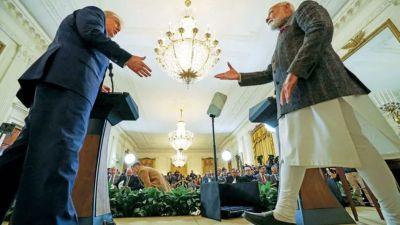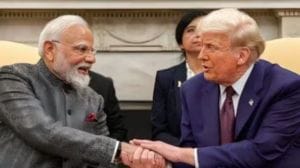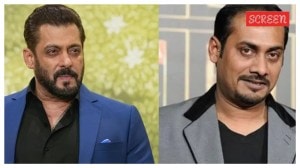The Antulay discord
Must interpretation of every remark be prefaced with the identity of the speaker?

The Antulay affair has again demonstrated how quickly our politics descends into discord, confusion and mendacity. It is important to be clear about A.R. Antulay’s transgression. His transgression was not that he made a statement calling for all aspects of the Mumbai attack to be thoroughly investigated, and demanded that some seeming anomalies be explained. Such a demand would have been unexceptionable. It would have been odd coming from a member of the cabinet; if the government is not undertaking a comprehensive investigation of all aspects of the attack, it has no business being in office.
His transgression was that he also insinuated a conspiracy behind the deaths of Hemant Karkare and other police officers. It is an insinuation without basis in facts, and damages the credibility of his own government, the strength of India’s case and the morale of law enforcement forces. It is important to remember this because both Antulay’s post facto justifications and Digvijay Singh’s evasive defence of Antulay cloak mischief by recasting his statement into an innocuous demand.
But other aspects to this debate are disturbing as well. If we have a hard time figuring out who controls Pakistan, it has to be said that we have an equally hard time figuring out what the Congress really thinks and who speaks for it. Managing the narrative of the Mumbai blasts was going to be crucial to the political fallout of this event. This management has two aspects. The first is administrative: that within government there be only one authoritative purveyor of the facts. Antulay undermined the authority of government. But the second aspect is more political. In times of crisis such as these, you don’t need a leadership that hides behind banalities and platitudes about fighting terrorism. The role of leadership is to politically reach out to all constituencies to assure them that the state will be impartial. But our dilemma is that there is no leadership, either from the prime minister or other leaders in the party that is doing the political hard work of talking to people and reaching out to them. And therefore it is not surprising that all kinds of forces come in to fill the vacuum.
Antulay is being credited with articulating that which many people are thinking. Even while the attacks were on I was privy to two disturbing text messages. One was sent out by a prominent left-secular activist declaring the Mumbai attack to be a Hindu conspiracy to finish off Karkare. The other was a businessman with BJP connections saying that the curse of the Sadhvi had fallen on the ATS because of the Malegaon investigation, and that we should rejoice at the outcome. It is often difficult to judge how widespread these views are (and even whether the people who propagate them would say the same thing at a different time during the day). But there are several issues here. A member of the cabinet does not have licence to speculate in the way ordinary citizens can in the privacy of their homes. On the contrary, the job of a good politician is to assuage anxiety, not increase it; resolve conflict, not add fuel to the fire. Second, we do need to acknowledge that we have a problem in civil society: different groups think the state is partisan, and they inhabit different discursive universes. And it would be foolish to be complacent about mutual suspicion amongst different communities. Despite the calls for rallying around in a show of unity, the state is struggling to establish its credibility. But irresponsible statements can put the government in the position of “heads, you lose, tails you lose.” I rather suspect that even if the Malegaon investigation is now pursued professionally, many more people will think it was being driven by the need to pander to politicians like Antulay. Our politicians’ need to speak is greater than their desire for achieving results.
But there is something disquieting about the so-called secular response to Antulay. The first line to reduce our anxiety over Antulay is to make the claim that not all, probably not even most Muslims think like him; he does not represent Muslims. The second is to say that his actions hurt Muslims because they lend credence to those who cast doubt on their loyalties. Both these claims are factually plausible. But the fact that we have to constantly resort to these facts suggests the deeper trap we are in. There is still no vocabulary we have to dissociate citizenship from identity. The answer to the “bad Muslim” is to trot the “good Muslim”. But the whole point of a progressive citizenship is to make the category “Muslim” or “Hindu” irrelevant to public argument. The over-sophisticated reply is that we cannot make these categories irrelevant: they are axes around which access to goods and rights are structured, and we have to take them into account. But this has become a self-defeating argument.
There is something deeply suffocating about a politics where the interpretation of every remark made has to be prefaced with the identity of the speaker. So what becomes salient about Antulay, even for secularists, is the fact that he is Muslim. Hannah Arendt once made the perceptive claim to the effect that a genuine politics of freedom can emerge only when identity such as “Jewishness”, “Muslim” or “Hindu” is treated simply as a fact, not as an actionable claim; nothing for politics should follow from that fact.
The Antulay episode reminds one of how far we are from this kind of politics. One recent illustration of this is the fact that a lot of the worries about the new anti-terror legislation highlighted the fact that it would be misused against minorities. Their opposition is based on the contingent fact that the state allegedly targets minorities more. This factual claim and what follows from it can be debated. But surely the point is that we worry about things like the admissibility of confession, or 180 days detention, not because minorities will be targeted, but because these things are wrong intrinsically and that anyone could be targeted. So even our civil liberties discourse is needlessly recast as a minoritarian discourse and aligned with identity claims. The larger challenge our politics will have to face is not that we have cranky, irresponsible, opportunistic, loose-tongued politicians of all hues and stripes. It is that we can never treat them as merely that. We have to constantly look out for the burden of identity they carry.
The writer is president, Centre for Policy Research, Delhi
express@expressindia.com
Photos



- 01
- 02
- 03
- 04
- 05



























